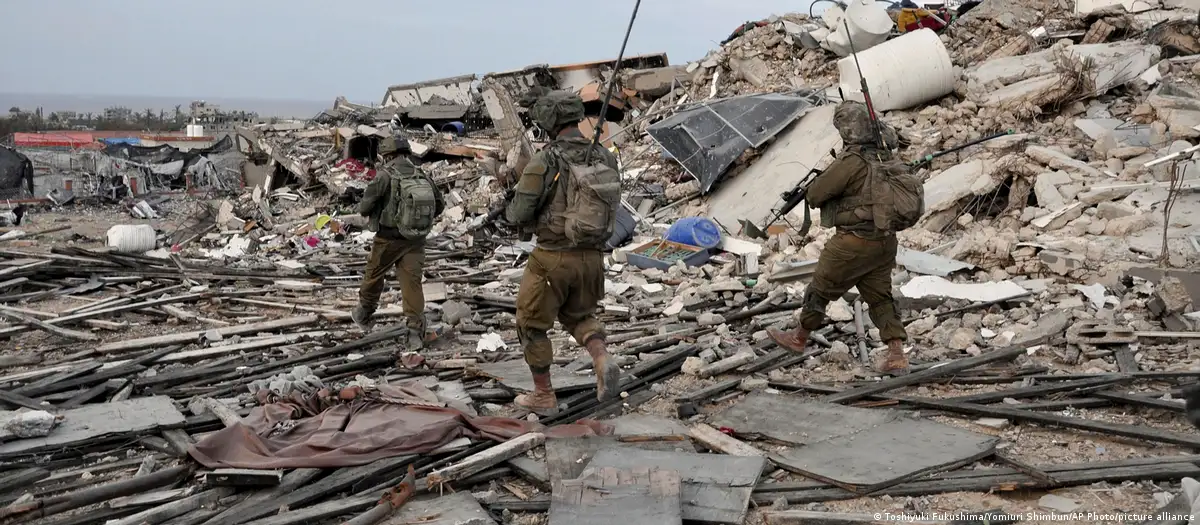Military experts say that such an undertaking would be extremely complex: an Israeli military incursion into the Gaza Strip could weaken the terrorist group, but defeating an ideology becomes almost impractical without an adequate political resolution.
(DW) Israel has already made its objective clear. The Islamic fundamentalist group Hamas must be “eliminated”, according to several high-ranking members of the government, including the country’s Prime Minister Benjamin Netanyahu.
Slogans such as “together we will win” are regularly aired on some Israeli broadcasters. But is it really possible to eliminate Hamas and “win” in a situation like this? The answer that has been repeated by experts is quite simple and straightforward: no.
Israel has been bombing the Gaza Strip, home to more than two million people, since the October 7 Hamas attacks on Israeli soil. The group is considered a terrorist organization by Israel, the European Union (EU), the United States, Germany and several other countries.
The Israelis are also carrying out a ground offensive in Gaza and imposing a blockade on the supply of food, water and electricity to the enclave.
But despite all this, analysts say it will be impossible to eradicate Hamas as a whole. The main reason for this is that Hamas is more than just a militant organization.
Hamas as a social movement
The group has between 20,000 and 30,000 fighters, Guido Steinberg, a Middle East expert at the German Institute for International and Security Affairs (Stiftung Wissenschaft und Politik, or SWP, in German), told DW. He added, however, that the organization “is also a social movement with massive support in the Gaza Strip. That’s the problem in the long run.”
Hamas has controlled Gaza since 2007. As part of its social movement, there is a welfare network known as Dawah. It is estimated that this civilian network has between 80,000 and 90,000 members.
The term Dawah means “call” or “invitation”, and is historically defined as a means of calling or inviting a greater number of adherents to one’s faith through social assistance, according to the Oxford Dictionary of Islam.
Israel “would love to eradicate Hamas as an institution, as a religious, cultural and military structure,” Rashid Khalidi, a professor of modern Arab studies at Columbia University in the United States, told the Spanish newspaper El País in a recent interview.
“I don’t think they will be able to achieve the first two things,” he said. “Even if they kill all the leaders, if they kill all the armed militants, Hamas will remain a political force, regardless of whether the Israelis occupy Gaza or leave. In this context, destroying Hamas as a political institution, destroying Hamas as an idea, is impossible.”
Hamas does not recognize the State of Israel. The group believes that religion should be the basis of any Palestinian government. However, it is probably its self-declared position as a resistance and opposition movement to the Israeli occupation of the Palestinian territories and the Gaza Strip that makes it most popular.
Khalidi, however, noted that what the Israelis might be able to do is degrade Hamas’ military capabilities, “but only to a limited extent and period”.
Destroying Hamas’ military potential
Israel has one of the most powerful armed forces in the world, ranking 18th out of 145 countries in 2023, according to the annual Global Firepower military power ranking
. Germany, for example, is in 25th place. The Stockholm International Peace Research Institute (Sipri) reported that last year Israel spent 4.5% of its national budget on defense – higher than the United States and Germany, which spent 3.5% and 1.4% respectively.
At the same time, Hamas’ armed arm operates more like a guerrilla group, smuggling most of its weapons into the Gaza Strip.
Israel therefore has the resources to cause considerable damage to Hamas and hunt down its leaders. Although the figures cannot be independently verified, the Israeli government recently claimed to have killed between 5,000 and 7,000 Hamas fighters.
If this is true, it could be considered a partial success, since the weakening of Hamas could thus have been better than expected. “Some Western authorities believe that the Israeli offensive so far, in combination with the reinforcement of border security, has already ensured that Hamas will not be able to launch another attack like the one on October 7,” wrote experts from the International Crisis Group (ICS) last week.
“Just as it did after conflicts with Israel in 2009, 2012, 2014 and 2021, Hamas will almost certainly rearm and restore itself,” says Dennis Ross, a former US envoy to the Middle East, in an article published in The New York Times at the end of October. He explained that this is precisely why he is against a ceasefire until Hamas is removed from power.

Difficulty in defeating guerrillas
At the same time, few national armies have managed to defeat guerrilla organizations decisively in the past. Unsuccessful examples include American efforts against the Taliban in Afghanistan and insurgent groups in Iraq. The Sri Lankan government’s victory against the separatist Tamil Tigers in the civil war that ravaged the country is often cited as a case in which an army managed to emerge victorious.
But it is known that this victory cost the country 26 years of war, with casualties of between 80,000 and 100,000 and potential war crimes committed by both sides.
*** Translated by DEFCONPress FYI Team ***
